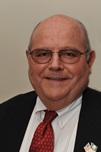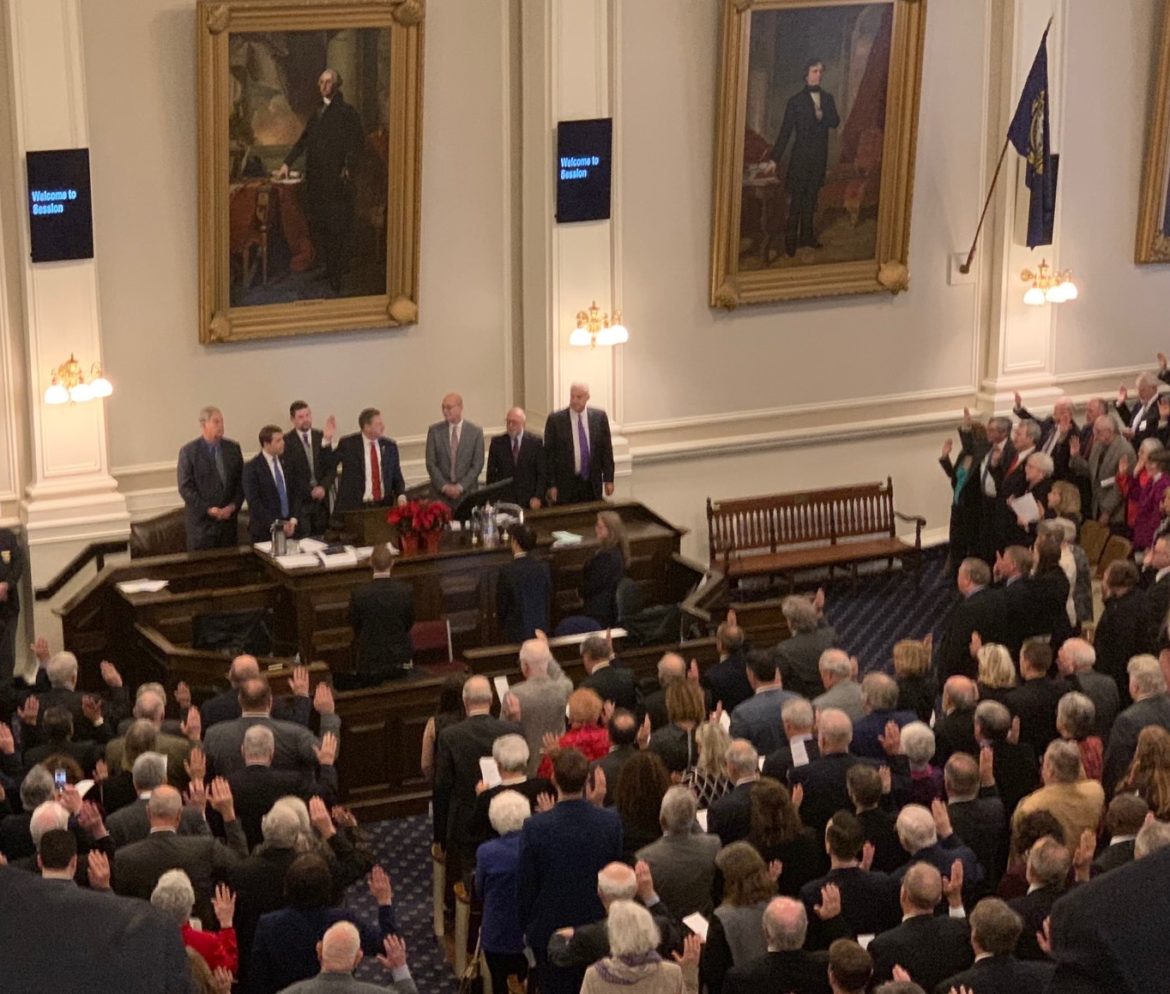Distant Dome is co-published by InDepthNH.org and Manchester Ink Link
By GARRY RAYNO, Distant Dome
CONCORD – The only unknown on Organization Day last week was who would be the Secretary of State: Bill Gardner who has held the post for more than four decades or former political operative, executive councilor and Democratic gubernatorial candidate Colin Van Ostern.
Gardner prevailed by the thinnest of margins, but among the pomp and circumstance and what is usually a Kumbaya event when one party has won a sizable majority in both the House and Senate, there was a little too much truth-telling if not a finger in the eye.
House Minority Leader Dick Hinch, a Merrimack Republican, let the elephant out of the bag saying essentially it was going to be war for the next two years because the real prize is the 2020 election and control of the legislature.
A few short paragraphs into his speech seeking the votes of House members to be the next speaker (more on that later), Hinch slid from uniter to partisan.

Rep. Dick Hinch, House Minority Leader
“My message for my fellow Republicans: being in the minority carries added challenges, but those challenges can turn into opportunities to build for the future. 2020 must always be on our minds, and everything we do must be to achieve absolute success in 2020,” Hinch said. “Never lose sight of the fact that 2020 establishes redistricting, and the majority that controls redistricting will likely control the next ten years thereafter.”
He added “… we must start today to recruit and fund-raise for the 2020 election.”
So, the message to Republican House members is to take every opportunity you can to disrupt Democrats’ momentum and contrast yourselves with the majority who are big spenders, taxers and regulators.
Then again he calls for unity among House members saying both sides need to work together for the state’s benefit.

Garry Rayno
Kind of a Jekyll and Hyde approach to leadership or you might call it divide and conquer.
After the 2010 election, Republicans had a veto-proof majority in the Senate and House and drew the political boundaries to their overwhelming advantage. Then Gov. John Lynch signed the Senate bill drawing the new boundaries, but let the House bill go without his signature. Vetoes would have been easily overridden.
The gerrymandering worked well in the Senate. Democratic candidates received more votes than their Republican counterparts, but still were in the minority after the 2012 and 2014 elections.
Democrats won the House in 2012 due to a strong showing by President Barack Obama at the top of the ticket dragging the House with him.
A constitutional amendment passed before the 2011 redistricting requires a more one-man, one-vote approach to House districts. According to the 2010 census each House member should represent approximately 3,300 residents. So, if a town’s population is near that number, it should have its own House district.
The change seeks to diminish the number of floterial districts used in the past to up the ante for the majority party.
That is the theory, but reality is often different when it comes to drawing political boundaries.
In essence, Hinch told his fellow Republicans let’s ensure the GOP wins in two years so we can gerrymander the House districts to stay in power for the next decade.
Democrats know what is at stake and are so close to being able to draw the state’s political boundaries for the first time in ages they are not likely to pursue controversial proposals in the next two years that could cost them significant votes in the 2020 election.

Rep. Marjorie Smith
However, Democrats being Democrats, one of its long-time House members, Rep. Marjorie Smith of Durham, filed a proposed bill to establish an independent commission to redraw the political boundaries to take partisanship out of the process.
The bill would be similar to ones proposed by Democrats in the 2017 session that required an equal number of Democrats and Republicans on a commission to draw a plan that the House and Senate would have to approve. The bill was resoundingly opposed by Republicans and defeated.
Gov. Chris Sununu’s office has said he believes the current system works fine as is.
In the 2002 session, the GOP controlled legislature approved redistricting plans that then-Gov. Jeanne Shaheen vetoed.

U.S. Sen. Jeanne Shaheen, D-NH
The governor and legislature could not agree on a plan and the Supreme Court had to redraw the boundaries.
The court hired an independent firm that did the work and within two elections, Democrats controlled the House, Senate and Executive Council.
Democratic leaders may have second thoughts about the independent commission as well, although Senate President Donna Soucy has been a strong supporter.
It may be too tempting to not want to draw the boundaries for the next decade and 2020 is a Presidential election year with President Trump topping the GOP side of the ballot.
The two parties will try to put their best foot forward as they race to the 2020 elections. The effort to control the 2021-2022 Legislature will underlie much of what happens for the next two years.
Contrast
Organization Day presented two distinct pictures: smooth seamless transfer of power and the rocky road to control.

House Speaker Steve Shurtleff
In both the House and Senate, the leadership was never a question: Donna Soucy would be Senate President and Steve Shurtleff would be House Speaker with Democrats in firm control.
In the Senate, former President Sylvia Larsen of Concord was unanimously chosen as temporary presiding officer.
She talked for a couple minutes about trust in each other and then opened the floor for nominations.

Sen. Donna Soucy, Senate President
Majority Leader Dan Feltes of Concord gave the nominating speech for Soucy touting her years of public service to her city and the state, followed by former President and now Minority Leader Chuck Morse of Salem who said he had great respect for her and noted the Senate’s small size and need to work together to solve the state’s problems.
Soucy was approved on a voice vote with no “No’s” to be heard in the recently renovated chamber.
The House was a different story.
Republicans nominated Hinch as speaker, who gave the speech outlined above, and then the Democrats nominated Shurtleff who noted his ability to work with both sides of the aisle.
In the past a voice vote would be taken because the outcome is not in doubt and then the losing candidate would ask for a unanimous vote for the other candidate to be speaker.
Not Wednesday
Instead, a physical vote was taken with the nearly 400 members going to four different ballot boxes around Representatives Hall to cast their votes, a process that took more than an hour before the tally was announced with Shurtleff winning 237-152.
Then Hinch asked to make it unanimous, which was done.
But the challenges did not end there.
The real battle last week was for secretary of state who is elected by a joint convention of the House and Senate members.
The first vote did not produce a winner although Gardner had one more vote than Van Ostern. Tradition is that 50 percent plus one of those voting is needed. Gardner needed 208 votes to win but received one vote less.
So Shurtleff called for a short recess for the two sides to regroup and then there would be short speeches and another vote.
Feltes suggested the two candidates be allowed to address the joint convention, but Shurtleff said Republicans objected. In most instances a person who is not a House member or Senator needs the support of all House members to address the body.
Feltes, Shurtleff’s senator challenged the ruling of the chair.
Some wanted a roll call, but members did not have assigned seats and the electronic voting system was not activated.
Eventually, they agreed to a voice vote to uphold Shurtleff’s ruling.
For his first day holding the gavel, Shurtleff kept his cool in what was an often confusing and contentious day.
House and Senate members can now take a break until the first Wednesday after the first Tuesday or Jan. 2 for the opening day of the 2019 session. The next day Sununu and the Executive Councilors will be sworn into office.
Garry Rayno may be reached at garry.rayno@yahoo.com
Distant Dome by veteran journalist Garry Rayno explores a broader perspective on the State House and state happenings. Over his three-decade career, Rayno covered the NH State House for the New Hampshire Union Leader and Foster’s Daily Democrat. During his career, his coverage spanned the news spectrum, from local planning, school and select boards, to national issues such as electric industry deregulation and Presidential primaries. Rayno lives with his wife Carolyn in New London.





